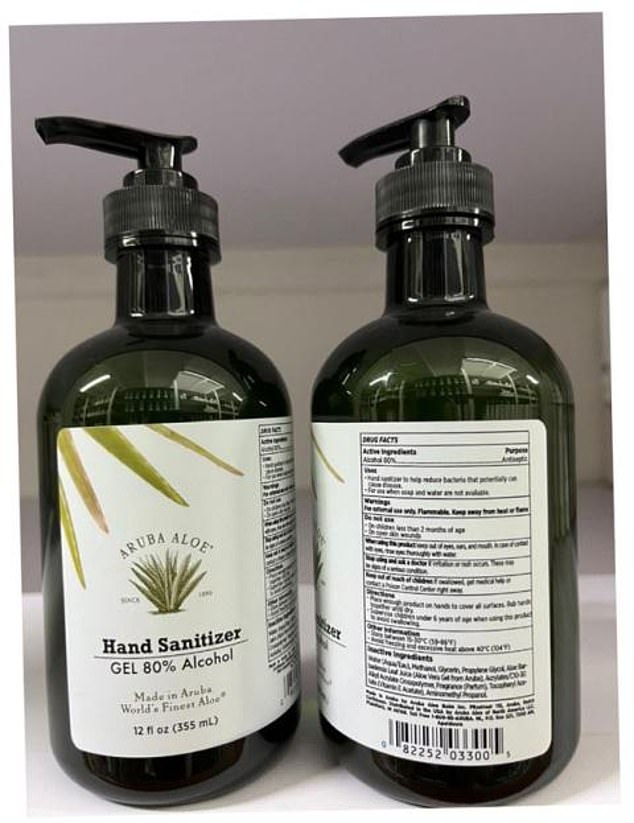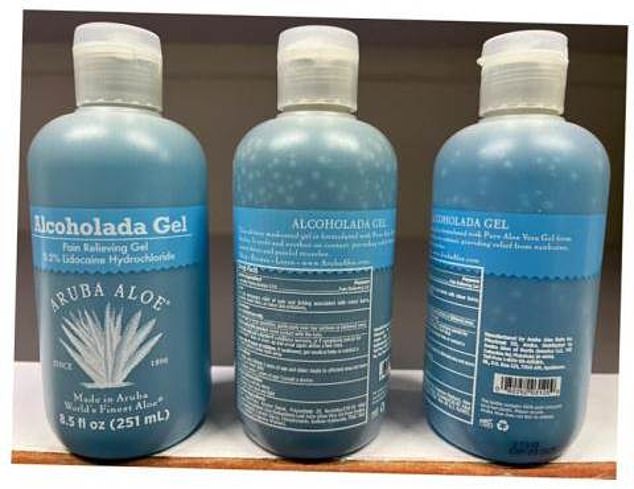- The products were found to contain methanol, which is toxic to humans.
- Young children who may accidentally ingest hand sanitizer are most at risk
- READ MORE: Big pharmaceutical companies have already raised the prices of 770 drugs in 2024
<!–
<!–
<!– <!–
<!–
<!–
<!–
Popular brands of hand sanitizer and aloe have been recalled due to a common ingredient that can cause coma and blindness.
Approximately 40 lots of Aruba Aloe Alcoholada 80 percent hand sanitizer gel and Aruba Aloe Alcoholada Gel hand sanitizer gel were removed from shelves because they contained methanol.
A notice posted by the FDA says customers should stop using the products and throw them away. Hand sanitizers in particular have become more popular since the Covid pandemic.
“Substantial exposure to methanol” can cause nausea, vomiting, headache, blurred vision, coma, seizures, permanent blindness, permanent damage to the central nervous system or even death, the agency said.

Approximately 40 lots of Aruba Aloe Hand Sanitizer Gel Alcohol 80 percent and Aruba Aloe Alcoholada Hand Sanitizer Gel have been recalled.


Aruba Aloe Alcoholada Gel is an analgesic gel used to temporarily reduce pain and itching related to minor burns, sunburns, insect bites or minor skin irritations. It has been removed from the market due to its methanol content.
Young children who may accidentally ingest hand sanitizer and young adults who drink hand sanitizer as a substitute for alcohol are at increased risk of methanol poisoning, the FDA warned.
Aruba Aloe Balm NV, the manufacturer of the hand sanitizers, has not received any reports of adverse events related to these products to date.
Methanol is often deliberately added to beverages or alcohol products as a cheaper alternative to ethanol, which is what normal consuming alcohol is made of.
The affected hand sanitizers are packaged in dark green, 12-fluid-ounce plastic bottles with a white label that reads “ARUBA ALOE HAND SANITIZER GEL 80% alcohol made with the world’s best aloe from Aruba.”
They are used to clean people’s hands and help reduce bacteria that can potentially cause illness.
The other affected product is Aruba Aloe Alcohol Gel, which is a pain-relieving gel used to temporarily reduce pain and itching related to minor burns, sunburn, insect bites, or minor skin irritations.
It comes in two sizes: 2.2 fluid ounce and 8.5 fluid ounce plastic bottles.
The products were sold online in the US between May 1, 2021 and October 27, 2023 through the Aruba Aloe Balm NV website.
Methanol, also known as methyl alcohol or wood alcohol, is a colorless liquid with a pungent alcohol odor that is used to disinfect surfaces.
While it is found naturally in wood, it is toxic to humans and animals and can cause serious damage to the body’s organs if a person ingests it, inhales it, or comes into contact with their skin.
It should not be used as hand sanitizer, according to the Methanol Institute.
The FDA does not quantify “substantial exposure to methanol,” but according to research published on the NIH websiteA potentially lethal dose of methanol is approximately 30 to 240 ml, or one gram per kilogram.
Permanent visual damage could occur from ingesting as little as 30 ml of methanol, he said.
